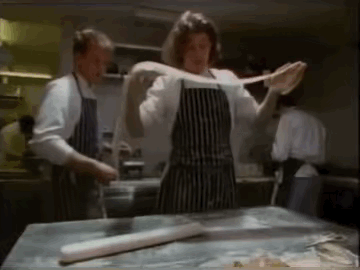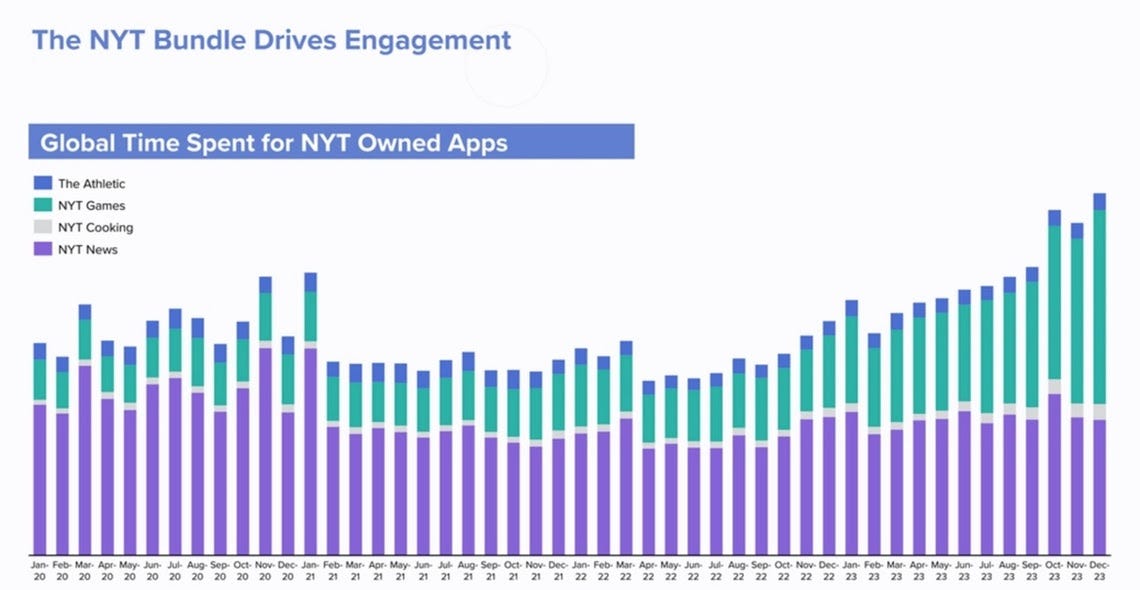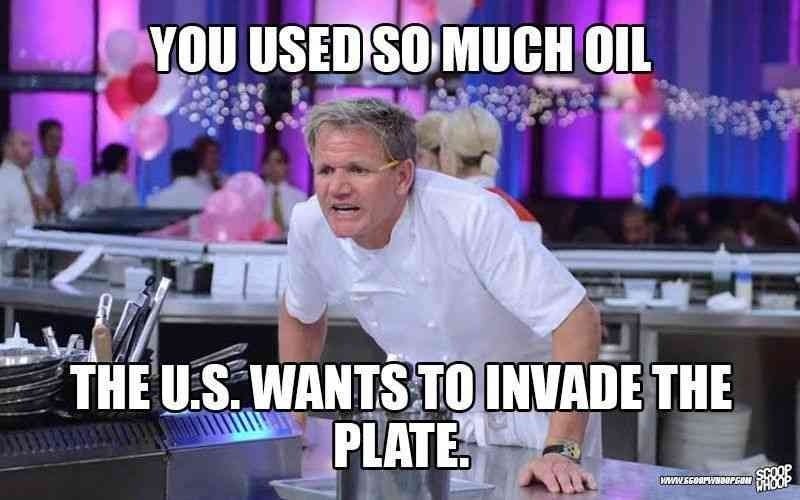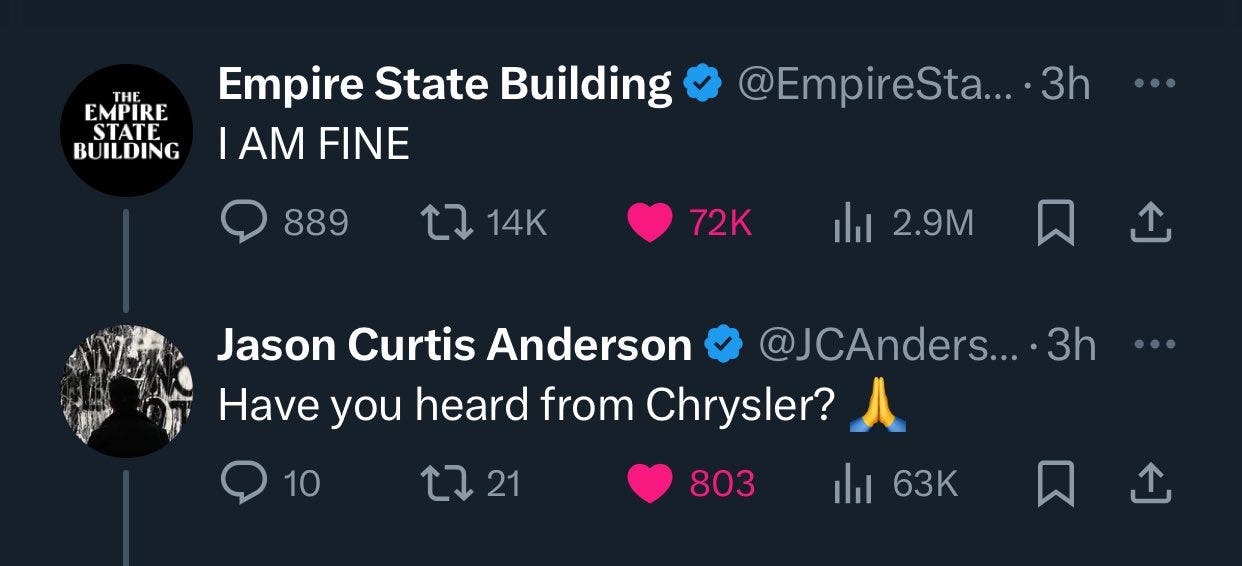Gordon Ramsay's Apprenticeship
The iconic chef says that a top-tier mentor (Marco Pierre White) taught him the importance of learning high standards and how to take the reins.
Thanks for subscribing to SatPost.
Today, we are talking about Gordon Ramsay’s mentor-apprenticeship relationship with Marco Pierre White (and how its changed his career).
Why is Costco’s vodka so good?
NYT is a gaming app
…and them fire memes (including NYC earthquake)
A random Google Docs file I have is titled “famous people before they were famous”.
It’s a compilation of video clips and photos of famous people before…well, you get it.
The most obvious places to find this type of content are sports and entertainment because these industries have so much footage of a person’s journey from amateur to pro.
Think of Nirvana, Dave Chappelle, Tom Brady, Kanye West, Leonardo DiCaprio, Steph Curry, Keanu Reeves, BTS, The Rock, Beyonce etc.
However, my favourite clip in the Doc isn’t music, film or sport.
It is of a 22-year old Gordon Ramsay training under Marco Pierre White, the first UK chef to earn three Michelin Stars (and often called the first “celebrity chef”). Before he was famous — and had a ubiquitous food and media empire — Ramsay was an early-20 something learning machine trying to soak up every drip of knowledge that White would share.
Go through your mental rolodex for memories of Ramsay.
What comes to mind? Probably the most artistic use of swear words that have ever graced a TV screen? Or maybe an undercooked fish being thrown across the kitchen? Or is it a yelling match with a non-compliant underling? Does the banger “idiot sandwich” come to mind?
No matter what you’re imagining, I can guarantee that it is the polar opposite of the aforementioned video showing the 22-year old Gordon Ramsay in the late 1980s.
White is the clear alpha in the kitchen. In fact, the clip comes from a British TV show that was documenting White’s cooking escapades (that restaurant had one Michelin Star).
Ramsay is as anonymous as the pasta-rolling machine White teaches him how to use.
There is no yelling from Ramsay. No cussing. No fish-throwing.
Only him following orders.
My favourite exchange is when White asks Ramsay if he had run the pasta sheet through the machine twice. The kitchen is making White’s famous lobster ravioli and that pasta sheet has to be the perfect thickness.
“Yes,” Ramsay says in barely audible voice. This is assuredly the softest “yes” that Ramsay has ever uttered in his life and here is a GIF to commemorate the exact moment.
See Ramsay’s dinky little head nod? Look at their body languages. White (the mentor) completely dominates Ramsay (the apprentice).
The exchange is a microcosm of their relationship. I’m not going to sugarcoat it. White was volatile and made Ramsay cry on multiple occasions. The stories of how White treated Ramsay are identical to the videos we’ve all seen of Ramsay exploding at his staff.
From the outside, it is easy to say “that is awful” and “I would never allow that to happen”.
But everyone has different motivations and pain thresholds.
Ramsay and White had a falling out for years but their relationship has gotten back on better terms. In a 2023 interview with the High Performance Podcast, Ramsay credits White for his success and highlights some key lessons from the experience:
Learn high standards: “I stood alongside Marco for two years. Side-by-side for 16 hours a day. It was relentless. I was in that pursuit of perfection and this guy put food on a plate like Picasso. I wanted to get that level of discipline. He wanted you to be pushed to the extreme. He drummed it into you.
[His stance was ] If you're gonna to do it then do it to your best. If you don't want to do it to your best then get the f**k out of here [and] don't waste my time and certainly don't waste yours.I see these environments all the time time and I say to [younger chefs] ‘stay in that environment and get what you need…and when the sh*t hits the fan, learn to dance in the storm.’ It's a great place to be in because somewhere down the line, there's going to be a storm on your radar and you're going to stand tall in that storm and you're going to get through it.”
Jump at opportunities: “Marco was away [one] weekend and…couldn't come back to the restaurant to open it after the holidays. All of a sudden, I was in charge and he was on the phone every two minutes explaining what to do. I knew what to do but I'd never been given the reins. At 22 years old…I didn't really understand the amount of pressure I was under at that particular time but what I did see was empty plates coming back from the restaurant and it was a high-octane 2-Michelin Star establishment and every customer was licking their lips. Every customer couldn’t believe how good the food was. It was in that moment that I realized what he’d given me and taught me. I replicated it and now I need to become an individual. I need to step away from what [Marco showed] me and I need to search for my own [path].”
No job is too small: “There wasn't any area in that kitchen or restaurant or bar or wine cellar that I hadn't tackled…I knew my weaknesses. [When I stepped into a different restaurant, I had never baked] but if I was going to have my own business, I needed to understand how to bake. You have to find your weaknesses…so when that storm comes, you aren’t depending on anybody.”
The apprentice’s advantage = more flexibility: “After spending a couple of years with Marco, I had [to try something different]. That’s what got me into [a 3-Michelin Star French restaurant called Le Gavroche]. I had to go to France because I [wanted] to come back [to the UK[ and outsmart Marco. He had never gone to France because he got stopped in his tracks and got too big too soon [in the UK], so he couldn’t disappear to France. I knew I had that little advantage. I’m going to go off to France to become French and absorb myself in one of the most amazing countries in the world and gather more intel. [When I come back to the UK], I can outsmart everybody.”
The restaurant industry is notorious for its high-pressure environments and tough mentor-apprentice relationships.
These themes were driven home in FX’s hit show The Bear, which follows the struggles of a young Michelin-calibre chef. The show’s 2nd season just swept at the Emmy’s, winning best comedy series, best director of a comedy and acting awards for Jeremy Allen White (the Michelin mentor figure) and Ayo Edebiri (a talented apprentice).
While it is a comedy, many chefs have said they couldn’t watch the show because it was “too real” and gave them “PTSD” from their experiences in the kitchen. Episode 7 of Season 1 perfectly captures the cooking insanity (in sum: The Bear is very very good).
But if we’re going to talk about the intensity of the restaurant world, we have to reference Anthony Bourdain. The late chef, author and food icon gave a talk in 2006 on management and leadership lessons from the kitchen.
In one part he talks about newcomers to the restaurant industry. Specifically, newcomers who have found success in white-collar professions and were inspired to cook because they “saw Rachel Ray on TV”. It is easy to romanticize the kitchen life if you only see it from the dining area.
The kitchen is madness and the mentor-apprentice relationship is important for quickly understanding if someone is cut out for the trade, per Bourdain:
“People in the restaurant business are not nice sometimes. They're not fair. [But] can you take that? Hence, the gentle art of hazing. Now, I'm not saying you should ever bully anyone out of sheer joy [or be a] cruel and sadistic bastard.
But there is a sort of natural progression working in kitchens. A new guy shows up and you'll notice nobody calls them by their name. Everybody's kind of pushing them. I’m sure many of the chefs here have seen this again and again. […]
[A lot of people have idealized visions of the restaurant industry but] this business is hard…there is no secret recipe. This is a mentoring business. Chefs — one at a time — teach someone. [We invest time and decide if it’s worthwhile to teach a person] everything we know and everything we have learned…over a 20 or 30-year career. All those things that we have learned, often quite painfully and at great personal expense. [We teach] through repetition because that's the way we all learn. Repetition, repetition, repetition.
I would like to know now — or as soon as possible — if you're going to start crying and freaking out…So, if I have to push you a little bit…we're just separating you out from the herd.”
Bourdain further explains why kitchens are this way. The environment is hot and crowded. There is a huge emphasis on consistency, which makes a lot of the tasks — like cutting shallots — very monotonous. There is also a lot of alcohol involved and so on.
If you are not cut out for the trade, that is fine. I have never worked in a kitchen and don’t think I would do well. Bourdain is kind of talking about a more general life lesson. What is the actual cost of success and are you willing to pay it? Not “what is the cost of an idealized professional life that someone perfectly curates on social media” but the actual cost of the job you want to pursue.
I took the LSAT years ago and considered going to law school. Months into the application process, I actually had no idea what a legal career entailed. I was a big fan of Tom Cruise in A Few Good Men (“Did you order the code red?”) and watched a ludicrous amount of Law & Order.
Then I talked to a friend in corporate law who actually explained the day-to-day job and left me with this thought, “Well, law school is nothing like being a lawyer. And being a lawyer is definitely nothing like Law & Order.”
So yeah, no law school for me (and apologies for any past newsletters where I wrote with the confidence of a legal professional).
Anyways, after watching the young Ramsay in White's kitchen, I was able to hunt down a YouTube video of an older Ramsay on Bourdain’s food show No Reservations.
The clip I found is a perfect bookend to Ramsay training under White.
Bourdain was visiting London in 2001 for show. Ramsay had officially become a 3-star Michelin chef and it was about 14 years after the clip of “Ramsay looking meek in White’s kitchen”.
“Generally, I’m not a submissive sort of a guy,” Bourdain says in his always-incredible narration. “But there are a few times in your life when you know you’re going to have a great time and have a great meal and give yourself over to the experience. And that’s what I’m about to do. The fearsome, the terrifying Gordon Ramsay Restaurant. [Ramsay] is considered to be the best chef in all of England, end of story. He’s operating…at a level that requires nothing but excellence. Famously abrasive and brilliantly talented.”
The first dish that Ramsay serves Bourdain is a “ham hock terrine on top of celeriac”. I don’t know what this is but Bourdain loves it. Two dishes later, Ramsay serves Bourdain a lobster ravioli, looking a lot like the one he made under White.
It looks effin' delicious and is a pretty clear signifier that the apprentice had become a mentor.
Today’s SatPost is brought to you by Bearly.AI
Why are you seeing this ad?
Because I co-founded an AI-powered research app and my technical partner is doing all the real work while I make dumb jokes and offer coupons.
We just added Claude Opus, a powerful new AI language model for querying, summarizing and editing large text documents (or help with your code, which I can't do but you might find helpful).
Use code BEARLY1 for a free month of the Bearly AI Pro Plan and try Claude Opus.
Links and Memes
Is Costco’s vodka actually good? Slate has a solid deep dive into Costco’s Kirkland Signature vodka, which many believe to be better than premium brands such as Grey Goose. In fact, the rumour has long been that Grey Goose — or its parent company Bacardi — produces Costco’s vodka.
In America, it’s against the law for a producer of an alcoholic beverage to also be the retailer. So, Costco definitely outsources production. The author of the article, Scott Nover, asked Grey Goose directly and they denied any Costco connection (Grey Goose doesn’t private label for anyone). Nover did track one brand down related to the Kirkland trademark but Costco is so secretive, the manufacturer remained mum about the relationship.
The funny thing about vodka is that it’s not meant to have standout features. It’s meant to be tasteless, colourless and odourless. In the article, vodka experts state that customers are mostly able to discern the difference in vodka based on the ingredient (corn, wheat, potato, rice). Or the price on the but only at the lower end (people can differentiate between a $15 bottle and a $40 bottle, as opposed to comparing a $40 bottle to a $400 one). I fully agree with the latter statement. When I was living in Vietnam, I used to drink something called Hanoi Vodka. It cost $1 per bottle and tasted like the smell of paint thinner. The "taste" — specifically, its awfulness — is permanently ingrained in my memory.
Marketing is the name of the game for vodka. One industry insider told Nover “I’ve launched $300 bottles of vodka and, honestly, blindfolded without the flashy bottling or marketing efforts behind said products, [it’s] very hard to tell the difference.”
So, is Costco’s vodka actually as good as many reviewers say it is (including NYT’s Wirecutter)? I’m skeptical. It’s probably on par with other name-brand vodkas but gets the added halo of being Kirkland, especially when carried around in the oversized comically 1.75L bottles.
***
NYT is a Gaming App: The most viral chart from last week was this image showing how the New York Times has morphed from a news business to a gaming business (eg. crossword, Wordle) based on the time spent on app. The visual is from activist investor ValueAct and makes a ton of sense.
Netflix founder Reed Hasting once said that his competition wasn’t other streaming services but “sleep”. NYT is ultimately in the attention game and it is competing against platforms like TikTok, Netflix, YouTube, Spotify, X, Instagram or Fortnite etc…rather than media outlets like The Wall Street Journal or The Washington Post.
NYT has done an incredible job of creating a bundle people are willing to pay for (even if news is an increasingly smaller part). My household is a weird outlier. We’re not huge into the games and only pay for the $4.99 Cooking App (which is decent).
***
Reed Hastings’ big failure: Speaking of the Netflix CEO, he was on the Tim Ferris podcast and its an hour of insights including one of his biggest Ls. In 2011, Hastings spun off the DVD-deliver business as “Qwikster” because he knew streaming was the future. But the messaging was horrible and streaming tech for Netflix was still too early.
It was a debacle and they had to backtrack. The lesson: on any future major corporate decisions, he had his senior team submit a score from 1-10 to rate a business idea. Basically, a lot of people inside the company knew Qwikster would be a disaster but no one spoke up because they didn’t have an input mechanism to do so (hence, the scoring system).
There are also details on Hastings’ new venture: a ski mountain in Utah that he is counter-positioning as much less busy than a typical Vail Ski Resort.
…and here them fire posts:
Finally, a 4.8 earthquake hit the New York / New Jersey region on Friday. Naturally, the X timeline filled up with the most out of control memes in the aftermath of the quake:














I never quite understood the need for the particular social dynamics in there. I guess it produces good chefs...? Although we have no proof what kind of chefs would've been created by other ways of training. In Ramsay's case it's of course also part of his show persona, but when you see how gentle he is with kids, it's obvious that he chose to let the rude shouty side of him shine instead of his patient mentor side.
That said, I would absolutely crumple up and die in a professional kitchen. I like to do precise stuff, I like to do it fast, I like to work hard, but if you keep yelling at me I'm done and also I might cry in the soup.
Okay - those really were some fire memes !